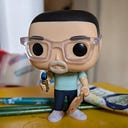Member-only story
Shop local, and get tested
Or, Tennessee Carney and the Quest for the Liquid Dulcolax
I lost my mother to cancer in 2010, and my involvement over several years, in her memory, with the American Cancer Society Relay For Life raised my awareness of the importance of colonoscopies.
When I got my first colonoscopy, in 2012, the procedure was recommended starting at age 50 unless there were other risk factors present. Now, they’ve dropped that to age 45.
In that first colonoscopy, the gastroenterologist found and removed a benign polyp. If he had not removed it, it could have become cancerous later on. That’s one of the unique things about a colonoscopy — it’s not only a test, but under the right circumstances it can actually prevent cancer.
Because they found a polyp, I am supposed to get colonoscopies every five years. (Otherwise, the interval would be 10 years.) My insurance company reminded me a few months ago that I was due for one, and so I scheduled it.
If you’re not familiar with how a colonoscopy works, the procedure itself is a breeze — you’re sedated, and don’t remember a thing. They insert a tiny video camera into your nether regions, along with a surgical tool that can cut off any polyps and retrieve them so that the tissue can be sent to a lab for testing.
